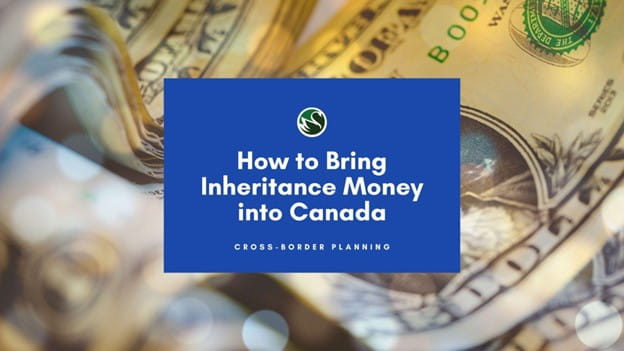How To Bring Inheritance Money Into Canada
Written by Tiffany Woodfield, TEP, Associate Portfolio Manager, CRPC®, CIM® and John Woodfield Portfolio Manager, CFP®, CIM®

Bringing Inheritance Money Into Canada From the U.S.
As a Canadian or dual citizen living in Canada, inheriting money from a relative in the U.S. can be both a blessing and a complex financial challenge.
Navigating the intricacies of receiving a cross-border inheritance involves understanding the tax implications, legal obligations, and the most efficient ways to transfer funds.
Here’s a basic guide on how to manage and bring U.S. inheritance money into Canada. Remember that this information is general, and you should always seek the advice of a cross-border financial advisor and accountant when dealing with a cross-border inheritance.
How To Bring Inheritance Money to Canada From the U.S.
Firstly, it’s crucial to recognize that transferring inheritance funds from the U.S. to Canada isn’t just about moving money across borders.
You must be aware of the financial and legal considerations to avoid potential pitfalls. Consulting with cross-border financial advisors, tax professionals, and legal experts is paramount to ensure compliance with U.S. and Canadian laws.
When you receive an inheritance from the U.S., you will need to consider the following steps:
- Notify your bank: Inform your Canadian bank about the incoming funds to facilitate the transfer.
- Understand the exchange rates: Be aware of current exchange rates and consider the timing of your transfer to maximize the value of your inheritance.
- Documentation: Ensure you have all necessary documentation, including the will, probate documents, and relevant tax forms.
General Inheritance Tax Implications in Canada
Canada doesn’t impose inheritance taxes.
However, that doesn’t mean an inheritance is entirely tax-free. The nature of the assets inherited and their value can influence your tax situation. For example, if you inherit securities or real estate, you may be subject to capital gains taxes when you sell these assets. It’s essential to consult with a financial advisor to understand the specific implications of your situation.
What You Need To Know about Capital Gains on an Inheritance
When you inherit assets such as stocks or real estate, the original cost basis can significantly affect the amount of capital gains tax you may owe.
Cost basis refers to the value of the assets when the deceased acquired them.
In Canada, the cost basis for inherited assets is typically the fair market value at the time of the benefactor's death. Thus, you only pay capital gains tax on the appreciation of the asset’s value from the time of inheritance to the time of sale.
In simple terms, you pay tax on how much the assets have grown in value from when you inherit them to when you sell them.
For example, if you inherit shares worth $100,000 (with an original cost basis of $50,000) and you later sell them for $120,000, you would only be subject to report capital gains tax on the $20,000 increase in value since you inherited them.
You wouldn’t pay capital gains tax on the full sale price of $120,000.
How To Report a Foreign Inheritance to the Canada Revenue Agency
Reporting a foreign inheritance to the Canada Revenue Agency (CRA) is crucial for compliance and avoiding potential penalties.
You must declare any foreign inheritance exceeding CAD 100,000 on Form T1135, the Foreign Income Verification Statement. On the form, you’ll include the details of the inheritance, such as the type of asset, its value, and the country of origin.
Failing to report can lead to significant fines and interest charges, so it's important to document and declare your inheritance meticulously.
Taxes on Foreign Property and Securities
If your inheritance includes foreign property or securities, additional tax considerations come into play.
Income generated from these assets, such as rental income or dividends, must be reported on your Canadian tax return. You may also be required to file specific forms like the T1142 (Information Return in Respect of Distributions from and Indebtedness to a Non-Resident Trust) if you receive distributions from foreign trusts.
Inheriting Real Estate and Trusts From Overseas
Inheriting real estate in the U.S. or other countries presents unique challenges.
You must navigate foreign property laws, potential estate taxes, and ongoing tax liabilities in the property’s country of location. Additionally, trusts established in the U.S. can have specific distribution rules and tax implications that may differ significantly from Canadian laws.
Consulting with cross-border legal and tax professionals can help you understand these complexities and determine the best action. Your best next steps may include selling the property, maintaining it as an investment, or transferring it into a Canadian trust. What you decide depends on your goals and financial situation.
A cross-border financial advisor may also be able to help you if you’ve inherited real estate or a trust in the U.S.
Foreign Tax Credits and Exemptions
To avoid double taxation on your inheritance, Canada offers foreign tax credits.
These credits allow you to deduct taxes paid to foreign governments from Canadian tax liabilities. For instance, if you paid U.S. estate taxes on an inherited property, you may be able to claim a foreign tax credit to offset your Canadian taxes.
It's essential to keep detailed records of foreign taxes paid and work with a cross-border accountant to accurately calculate and claim these credits.
Steps To Take after Receiving an Inheritance
Upon receiving an inheritance, follow these steps to ensure proper management and compliance:
- Assess the value: Determine the total value of the inheritance, including cash, investments, and property.
- Consult professionals: Engage with cross-border financial advisors, tax professionals, and legal experts.
- Develop a plan: Create a financial plan to manage and invest the inheritance wisely.
- Fulfill reporting and tax obligations: Complete all necessary reporting and tax obligations in the U.S. and Canada.
- Consider your goals: Align your inheritance with your long-term financial goals and family needs.
What Canadians Need To Know About Dealing with a U.S. Inheritance
Dealing with a U.S. inheritance as a Canadian or dual citizen requires careful planning and expert advice.
The cross-border nature of such inheritances introduces complexities that can impact your financial and tax situation significantly. By understanding the tax implications, reporting requirements, and best practices for managing inherited assets, you can ensure a smooth transfer of wealth and safeguard your financial future.
Always remember the importance of working with cross-border financial advisors well-versed in U.S. and Canadian regulations. Their expertise can help you navigate the complexities and optimize the benefits of your inheritance while minimizing potential liabilities.
If the inheritance is significant, it’s wise to seek out the advice of a cross-border accountant and financial advisor.
Common Questions About Handling a Foreign Inheritance in Canada
How much can you inherit without paying taxes in Canada?
Canada has no inheritance tax, so you can inherit any amount without paying taxes. However, taxes may be due on income generated from the inherited assets.
Does inheritance count as income?
Inheritance itself does not count as taxable income in Canada. However, any income generated from the inherited assets, such as interest, dividends, or capital gains, is taxable.
How much money can you receive as a gift from overseas in Canada?
There is no limit on how much money you can receive as a gift from overseas in Canada. However, you must report any foreign income generated from that gift on your tax return.
Can my parents give me $100,000 or more in Canada?
Your parents can give you $100,000 or more in Canada without incurring gift taxes, as Canada does not impose taxes on monetary gifts. However, any income earned from the gifted amount will be subject to taxation.
How much money can be legally given to a family member as a gift in Canada?
There is no legal limit on how much money you can give to a family member as a gift in Canada. The recipient will not have to pay taxes on the gift; any income generated from it will be taxable. However, the person who is giving the gift may have a tax liability if they are disposing of an asset that has increased in value. In addition, Canada has attribution rules that limit income splitting. If you are a U.S. person, you must consider the U.S. gift tax rules.
For more information on attribution rules CLICK HERE
When you inherit and sell a house, is it taxable in Canada?
When you sell an inherited house in Canada, you may be subject to capital gains tax on the appreciation in value since the time of inheritance. The capital gain is calculated based on the difference between the sale price and the fair market value at the date of inheritance. In addition, if the home is in the U.S. and you live in Canada, you must consider U.S. capital gains tax, potential estate taxes, and reporting requirements in both countries. Consulting with cross-border tax experts is essential to navigate these complexities and ensure compliance with U.S. and Canadian tax laws.
What should you not do with an inheritance?
You should not make hasty financial decisions or make significant investments without consulting a financial advisor. Avoid using the entire inheritance for non-essential spending, which can deplete the funds quickly.
What is the inheritance law in Canada?
Inheritance law in Canada varies by province, but generally, it involves the distribution of a deceased person's estate according to their will or, if there is no will, according to provincial intestacy laws. Executors must pay all debts and taxes of the estate before distributing assets to the beneficiaries.
Next Steps
If you’re a Canadian resident or are planning on moving to Canada or the U.S. and need assistance with moving and optimizing your investments, estate planning, wealth management and portfolio management, please get in touch. At SWAN Wealth, we specialize in Canadian financial planning, cross-border financial planning and cross-border wealth management.
Read More
If you’re planning a cross-border move, these articles and guides will help simplify your move and ensure you’ve covered everything.
What To Do With U.S. Mutual Funds in Canada
Work With a Cross-Border Financial Advisor
About the Authors
Tiffany Woodfield is an Associate Portfolio Manager licensed in Canada and the USA, a Chartered Investment Manager (CIM), a Chartered Retirement Planning Counselor (CRPC), a Trust and Estate Practitioner (TEP) and the co-founder of SWAN Wealth Management, along with her husband, John Woodfield. Tiffany advises clients who live in Canada and the United States and want to simplify their cross-border financial plan, move their assets across the border, and optimize their investments to minimize their tax burden. Together, Tiffany and John Woodfield help their clients simplify their cross-border finances and create long-term revenue streams to keep their assets safe whether they live in Canada or the U.S.
John Woodfield is a Financial Management Advisor (FMA), a Chartered Investment Manager (CIM), and a Certified Financial Planner (CFP), and in 2007 was inducted as a Fellow of the Canadian Securities Institute (FCSI). As a portfolio manager and CFP®, he works with clients across Canada. John Woodfield’s clients are families, individuals and business owners who understand the importance of comprehensive wealth and investment plans driven by the lifestyle they want to lead.
SCHEDULE A CALL
Schedule a 15-minute introductory call with SWAN Wealth Management. Click here to schedule a call.





